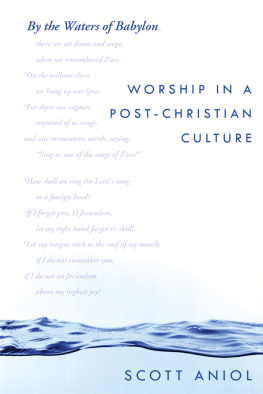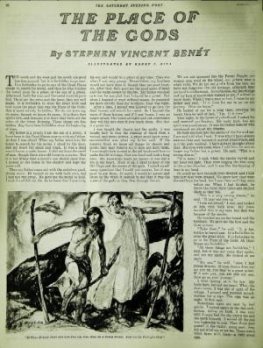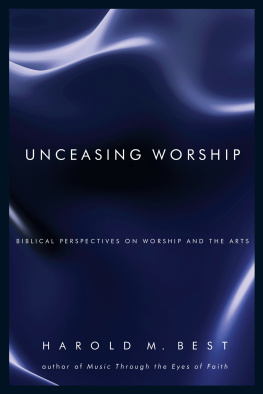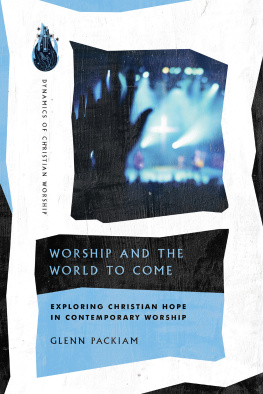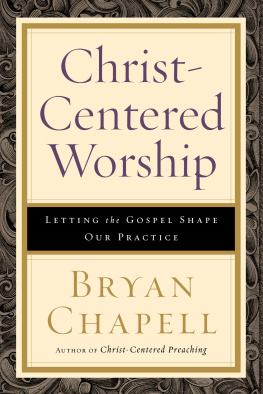Scott Aniols book contributes to several discussions at once. He provides an insightful critique of the Missional Church movement, interacts with the current discussion about Christianity and culture, and offers biblical direction for shaping worship in local congregations. The book is an important defense of conservative Christianity that manages to remain charitable in the face of significant disagreements. Aniols work should be required reading for every course in ecclesiology, missiology, and liturgics.
Kevin T. Bauder
Research Professor,
Central Baptist Theological Seminary of Minneapolis
In seeking to be biblical yet missional in worship, is your church finding it difficult to traverse the narrows between the Scylla of irrelevancy on the one side, and the Charybdis of cultural captivity on the other? With the wisdom and foresight of a skillful navigator, Scott Aniol points the way forward through a sophisticated examination of the emerging movement that has transformed many evangelical churches. Aniol contributes significantly to the contemporary discussion because he has a head surrendered to the Word of God and a heart fully dedicated to speaking the gospel to contemporary culture. This book will reset the discussion concerning what it means to worship God with missional force and scriptural fidelity.
Malcolm B. Yarnell III
Professor of Systematic Theology,
Southwestern Baptist Theological Seminary
Sacred cows usually make poor hamburgers, but Dr. Aniols book serves up tasty ones by addressing issues that have become twenty-first-century sacred cows, namely missional terms, values, and attitudes that one critiques only at great peril. Aniol does so carefully, with the skill of a surgeon, using a biblically balanced scalpel to address emergent church challenges and sets forth insightful correctives. He engages cultural concerns within the set of the larger issues of contextualization in the disciplines of missiology and cross-cultural communication of the gospel. This is a must read for those engaged in analysis of worship styles and missiology alike.
Keith Eitel
Professor of Missions & World Christian Studies,
Roy Fish School of Evangelism & Missions
Scott Aniols By the Waters of Babylon carefully assesses the nature of culture and worship with freshness and from a biblical base. Many will not agree with his conclusions, but no one engaged seriously in worship should fail to read this monograph. Clever, thought provoking, biblical, and firm, Aniols perspective is profoundly relevant to our churches today.
Paige Patterson
President, Southwestern Baptist Theological Seminary
In a day when cultural relativism has gripped the thinking of the church, we need Scott Aniols reminder that God is not only a culture maker but also a culture changer. I thank God for a book that exposes the myth of cultural neutrality, explains the wrong thinking that leads to it, and calls the church to embrace what he calls a sanctificationist approach to culture. I heartily recommend Aniols timely and articulate challenge to the popular versions of syncretistic contextualizing of worship that are so harming the church today. I pray that we will heed his appeal and return to worship that is regulated by scripture alone.
Scott T. Brown
Pastor, Hope Baptist Church
President, National Center for Family Integrated Churches
Dr. Aniol offers a groundbreaking treatment of the historical and philosophical underpinnings of Christian worship in the twenty-first century, integrating the themes of culture, mission, contextualization, and song for the post-Christian church. The research reflected here is of timeless value, and I expect to refer to it for decades to come.
Mark Snoeberger
Professor of Systematic Theology, Detroit Baptist Theological Seminary.

By the Waters of Babylon: Worship in a Post-Christian Culture
2015 by Scott Aniol
Published by Kregel Publications, a division of Kregel, Inc., 2450 Oak Industrial Dr. NE, Grand Rapids, MI 49505-6020.
All rights reserved. No part of this book may be reproduced, stored in a retrieval system, or transmitted in any form or by any meanselectronic, mechanical, photocopy, recording, or otherwisewithout written permission of the publisher, except for brief quotations in printed reviews.
All Scripture quotations, unless otherwise indicated, are from The Holy Bible, English Standard Version, copyright 2001 by Crossway Bibles, a division of Good News Publishers. Used by permission. All rights reserved.
Scripture quotations marked NASB are from the NEW AMERICAN STANDARD BIBLE, updated edition. Copyright 1960, 1962, 1963, 1968, 1971, 1972, 1973, 1975, 1977, 1995 by The Lockman Foundation. Used by permission. (www.Lockman.org)
Scripture quotations marked NIV are from the Holy Bible, New International Version. Copyright 1973, 1978, 1984, 2011 by International Bible Society. Used by permission of Zondervan. All rights reserved.
Verses on the cover are Psalm 137:1-6 from the ESV Bible (The Holy Bible, English Standard Version), copyright 2001 by Crossway, a publishing ministry of Good News Publishers. Used by permission. All rights reserved.
The Greek font GraecaU is available from www.linguistsoftware.com/lgku.htm, +1-425-775-1130.
Library of Congress Cataloging-in-Publication Data
Aniol, Scott.
By the waters of Babylon : worship in a post-Christian culture / Scott Aniol.
pages cm
Includes bibliographical references and index.
1. Public worship. 2. Christianity and culture. 3. PostmodernismReligious aspectsChristianity. I. Title.
BV15.A55 2015
264dc23
2014044106
ISBN 978-0-8254-4377-0
Printed in the United States of America
15 16 17 18 19 / 5 4 3 2 1
FOREWORD

by T. David Gordon
T he surprising acrimony that sometimes attended the worship wars of the last several decades suggested that we were talking past each other; that what we were talking about was somehow the tip of a larger, undiscussed iceberg beneath the surface. Almost all of us who have written about it have encountered opponents who misrepresented us substantially, if not entirelynot because they intended to do so, but because there are and were blindspots in the conversation, omissions that made it very difficult to hear what people actually were and were not saying. In this volume, Scott Aniol introduces us to the iceberg beneath the surface.
On first glance, some readers will wonder why a book about worship includes a discussion of the distinction between emerging, emergent, and missional churches. But Aniol demonstrates convincingly that behind these labels are different understandings not only of the relative priority of worship and mission, but even more profoundly different understandings of culture and cultural forms/norms. The first six chapters discuss these matters clearly, fairly, thoroughly, and judiciously; even readers who resolve some of the matters differently than the author will agree that he has represented their view justly, and has evaluated it dispassionately. The book would be valuable for these six chapters alone; and they would be useful as an introduction to cultural analysis and aesthetics on their own merits.
In these first six chapters, Aniol challenges the notion of cultural neutrality, a notion upon which much of contemporary Christian worship depends. He rightly argues that if individual sinners sometimes do unholy things, groups of such individual sinners also sometimes do unholy things, and what we call culture is merely the behavior that characterizes such groups of individuals. While of course Gods original created order was/is good, the works of rebellious sinners are not always good; and therefore Gods works and ours should not be confused: Wolters fails to distinguish between Gods creation and mans creation. He often conflates the two categories, equating the intrinsic goodness of Gods handiwork with what mankind produces (79). In the sixth chapter, Aniol presents a lucid, biblical, alternative to false, secular understandings of culture.

